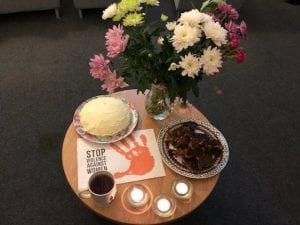Today’s guest blog is by students May Mundt-Leach and Erandi Barrera Moreno, founders of the newly formed Women Talk Back! group.
Every week on a Sunday evening, the Multifaith Chaplaincy is filled with women from across Bristol. The atmosphere is light-hearted but quietly expectant as we close the door and settle down together with a cup of tea and a piece (or several…) of homemade cake.
Women Talk Back! was inspired by bell hooks’ Talking Back: Thinking Feminist, Thinking Black and is a new and exciting space for women at the University of Bristol to talk about our lives and experiences in a relaxed and confidential setting. We may come from different courses, countries and backgrounds, but we all have one thing in common – the desire to discuss what it means to be a woman today. We use the long-standing, grassroots method of feminist ‘consciousness-raising’ to do so.
A central part of the Women’s Liberation Movement in Britain and the US in the 1970s and 80s, consciousness-raising (‘C-R’) attempts to bridge the gap between what we think and what we say. Through C-R, women learn that problems we thought were individual to us are, in fact, widespread political problems which emerge from structural forms of oppression. We realise that systems of power are present in our daily lives and majorly influence how we interact with both others and ourselves.
At Women Talk Back!, we choose a different topic to discuss every week. All women are free to attend as many or as few meetings as they like, with newcomers always welcome. So far, we have explored topics ranging from how it felt to grow up as female, to our feelings about motherhood, to cultural and social expectations that are placed on us around food and eating – all in the first three meetings!
Our programme for this term aims to leave no stone unturned. Pornography, race, sexuality, and body hair are all issues we will be discussing in the near future. We encourage women to suggest topics for us to discuss – and nothing will be deemed too trivial, obscure or off-limits.
The stigma of female body hair, for example, is something that pervades society and heavily influences women’s, particularly young women’s, relationships with our bodies. We’d like to ask why this is. Why do some women face harsher penalisations for their body hair than others? Whose interests does hair removal serve? Can our decision to remove our body hair (if we do) be simply reduced down to ‘choice’, or is the reality more complicated?
Women coming together with other women is a political act. Reserving space for ourselves as women, in light of our similarities and differences, is a political act. Looking each other in the eye and seeing not only her, but also an image of ourselves reflected back at us, can be simultaneously ground-breaking, frightening and exhilarating. María Lugones, Argentinian philosopher, organiser and educator, describes how “by travelling to [another woman’s] ‘world’ we can understand what it is to be them and what it is to be ourselves in their eyes”.
It is only through facing the true nature of the systems of which we are embedded in, that women can begin to piece together what is happening to us. And it is only through recognising the authenticity of our own, discrete experiences that we can begin freeingourselves from such systems. We started Women Talk Back! with one single aim – to provide a space where every woman feels she can speak her truth, and in doing so, reflect on not only her own life but the lives of all other women around her.
So come and join us – and if nothing else, we have cake!
Join the Women Talk Back! group via the Bristol SU website, or follow it on Facebook and Twitter to keep up to date with meetings, which are held every Sunday at 7pm in the Multifaith Chaplaincy.


